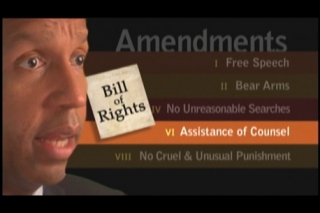About the Film
In the mid-twentieth century, a landmark Supreme Court case proves the Constitution’s resilience. In Gideon v. Wainwright, one man who thinks he was denied a basic right seeks the help of the Supreme Court. Clarence Earl Gideon was sitting in prison after having been found guilty of stealing pocket change and some liquor from a pool hall where he was known as one of the regulars. It was bad enough that he claimed he was innocent; but he also claimed that his Constitutional rights had been violated by the very court that tried and convicted him.
View the trailer:
It was Gideon’s belief – his other conviction, if you will – that the Constitution guaranteed him the right to a lawyer to defend him in court but the judge who presided over his trial refused to appoint counsel to assist him. As it happened, until that time, the courts agreed that Gideon was wrong.
As judges interpreted the Constitution until 1963, not every defendant throughout the 50 states could claim such a right. But lightning comes from the ground up. And when a yellow piece of prison stationary with a poor man’s scribblings landed in the mailroom of the highest court in the land, arguing that he should be heard, there was enough change in the air to suggest that the time for a universal right to counsel had come.
Further Reading
Look at Gideon’s handwritten petition to the Supreme Court, housed at the National Archives
Read the Sixth Amendment’s guarantee of the Right to Counsel
Read about the history and current struggles to protect the Right to Counsel
Credits
Producer and Writer, Robe Imbriano
Associate Producer, Maria E. Matasar-Padilla
Editors, Sak Costanzo and Liz Mermin
Graphics Animator, Stevie Clifton
Director of Photography, Edward Marritz
Narrator, Erik Todd Dellums
Host, Dan Harris
Production Associate, Konstantinos Kambouroglou
Coordinating Producer, Gabrielle Tenenbaum
Sound, Mark Mandler
Music, Gavin Allen and Ben Decter
Associate Editor, Marc Tidalgo
Senior Editorial Producer, Todd Brewster
Senior Producer, Kayce Freed Jennings
Executive Producer, Tom Yellin


